Eight photos that will make you care about the ocean
How do we get people to care about ocean conservation? Diving can help us explore the role of awe in protecting the planet's beating blue heart.
From swimming with humpback whales in the South Pacific to witnessing the frenzied feeding at South Africa's sardine run to photographing Antarctica underwater, I've been privileged to experience how the power of awe can inspire conservation efforts.
"Awe is the feeling of being in the presence of something vast," writes Dacher Keltner, author of Awe: The New Science of Everyday Wonder and How It Can Transform Your Life and leading scientist at UC Berkeley studying the emotion. In a world of constant disconnection, we seek ways to feel reconnected and enter a state of awe – that larger-than-life sensation evoked in big natural landscapes, shared human experiences and great acts of kindness and endeavour.
Diving beneath the surface is one of the easiest ways to evoke wonder. Through immersion, we dip below the thin blue line into another planet. With momentary weightlessness – the closest thing to becoming an astronaut on Earth – the noise quiets and our senses awaken to the magic of the underwater world. We experience the vastness of the ocean alongside the smallness of ourselves and our daily problems.
Awe led me to become an underwater photographer, environmental journalist and PADI AmbassaDiver. My mission is to convey this sense of wonder and showcase a blue world that is our collective responsibility to protect.
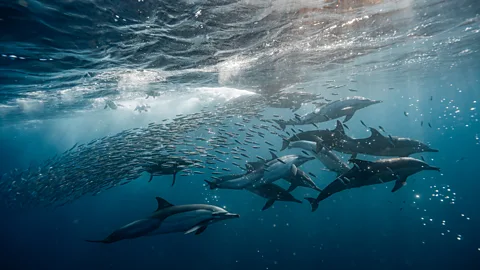 Pier Nirandara
Pier NirandaraSwimming with sharks
My conservation journey began with a trip to dive South Africa's sardine run. Nicknamed the "Blue Serengeti", this is the largest migratory event on earth in terms of biomass – even larger than that of the wildebeest across the Serengeti. Each year, billions of fish migrate up the country's eastern coastline, along with the predators that hunt them: sharks, dolphins, birds, whales and more.
I spent a week plunged into a spectacle of epic proportions: envision fish tightly packed into shimmering baitballs herded by pods of common dolphins and gannets that rained from the sky. Various sharks emerged from the depths to feed, each bite an eruption of scales glittering in the blue.
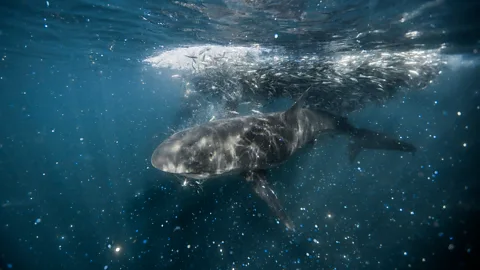 Pier Nirandara
Pier NirandaraThe ocean changed my life's trajectory – and it can alter yours too
The experience was a call to adventure, catapulting me from a Hollywood film-producing career into telling ocean stories full time. I no longer wanted to be a mere bystander to the degradation of our environment and the perils of climate change; I needed to become an active participant in its care. Awe-inspiring events like the sardine run have the capacity to shake us out of our daily rhythms, jolting us out of a state of inertia.
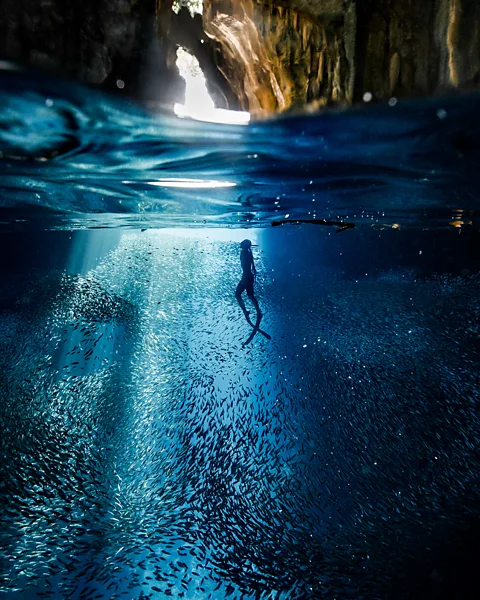 Pier Nirandara
Pier NirandaraChasing ocean stories around the world
My curiosity has seen me chase ocean stories from tip of Africa to the middle of the South Pacific. I've had the immense privilege of diving in some of the most magnificent habitats under the sea – places that demand protection for future generations. In the Kingdom of Tonga, I captured this image of a freediver emerging from the depths of a cave filled with shimmering fish. Contrary to popular belief, some of the most wonderful experiences don’t require a scuba diving certification. The ability to freedive, snorkel or swim – paired with strong sense of curiosity and a zest for adventure – is oftentimes enough.
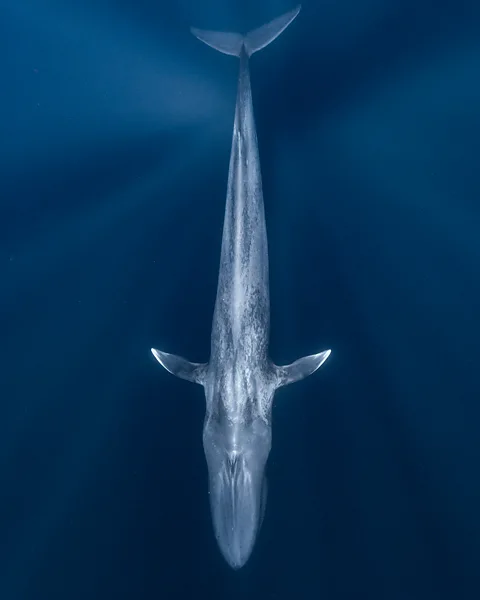 Pier Nirandara
Pier NirandaraCapturing hope: the importance of storytelling
In the Pacific Ocean, a blue whale swims in the deep blue. There's something undeniably humbling about sharing the water with the largest animal to have ever lived.
In capturing such scenes, I also capture stories, emotion and hope. Photography is the art of telling a story. It's one thing to take pretty pictures; it's another to evoke a reaction and make people feel awe, empathy or horror which can be used as catalysts for change. A well-told story elevates work beyond the ordinary, inspiring action towards social good for this blue dot we call home.
"Storytelling is fundamental to conservation," says Sylvia Earle, famed marine biologist, oceanographer and National Geographic Explorer at Large. "Caring is what causes us to change."
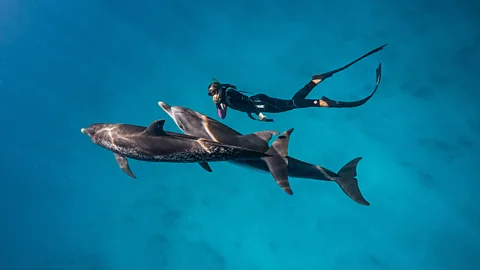 Pier Nirandara
Pier NirandaraScuba or snorkel?
Most big animal interactions are done when snorkelling versus scuba diving for a number of reasons. First, the animals move fast and are easier to keep up with when snorkelling. Secondly, many places prohibit scuba diving with megafauna. Finally, the interaction is less intrusive without the use of tanks and bubbles. Snorkelling also carries a lower barrier to entry and is less cost-prohibitive.
The perfect example of an encounter best done on snorkel? Swimming with Atlantic spotted dolphins off the coast of Bimini in the Bahamas.
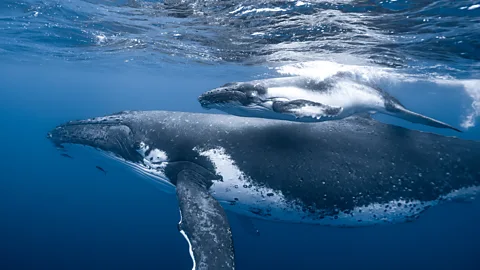 Pier Nirandara
Pier NirandaraBreaking down the walls of apathy
One of the biggest hurdles in the ocean conservation space is to "break down the walls of apathy", as described by National Geographic photographer Paul Nicklen. There is no going back to normalcy after swimming with a 30-ton humpback whale. You come back changed, caring for the marine environment. You know what's at stake.
One of the most renowned places for such an encounter is swimming with humpback whales in French Polynesia. Here, the waters are a deep, saturated blue, alive with the singing of cetaceans making a stopover on their way from Antarctica for the season. They arrive to mate, calve and nurse their young, and the energetic calves are milk-drunk, playful and curious.
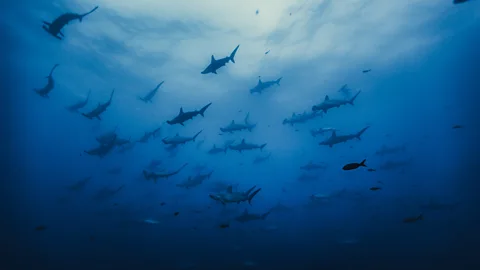 Pier Nirandara
Pier NirandaraThe narcotic thrill of the unknown
Week-long liveaboards to offshore pinnacles in the Galapagos or Revillagigedo Islands offer more advanced scuba divers wonderous encounters, such as hundreds of schooling hammerheads. A vital component of awe is the experience of facing something so large that it dwarfs us and puts our problems into perspective, and diving is the perfect backdrop for such encounters.
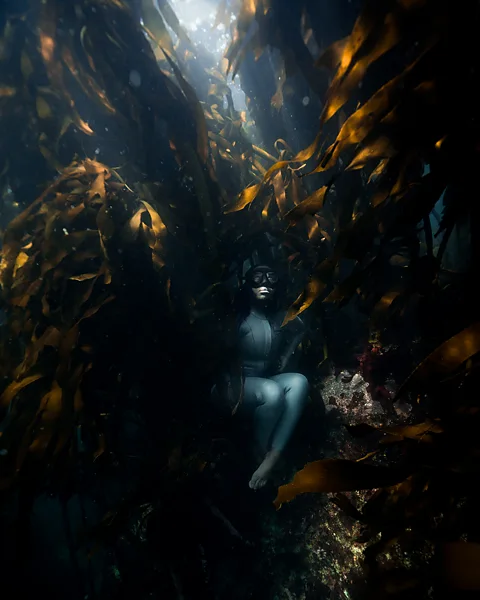 Pier Nirandara
Pier NirandaraThe ocean as a safe space for all
Our connection with the ocean runs deeper than surface level. "Seawater is so similar in mineral content to human blood plasma that our white blood cells can survive and function in it for some time," writes Bonnie Tsui in her book, Why We Swim. "We have seawater circulating in our veins."
-bbc






